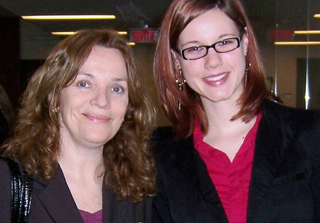It's not about the money
Tamara Nowicki did more than just pocket a few dollars on her most recent co-op work term. Nowicki, a second-year marketing co-op student in Concordia’s John Molson School of Business (JMSB), put her learning into practice this past summer at the Montreal Children’s Hospital (MCH).
The inner workings of a hospital are a mystery to most people. Nowicki got to immerse herself in the unique culture of the MCH, interacting with physicians, nurses and allied health professionals while she worked with the hospital’s public relations department. Now Nowicki brings this experience back to the classroom where she will share her knowledge with other students and her professors.
Nowicki says, “This term I’m taking a class in strategic Internet marketing. At the MCH I was able to see the importance of an effective website and how difficult it really can be to capture the market you are looking for. I know my experience will help me understand what I learn in this class. And after seeing how a non-profit organization works, I am strongly considering becoming a volunteer.”

Lisa Dutton, manager of public relations and communications at the MCH and Nowicki’s enthusiastic boss, did not need to be sold on the idea of having a co-op student. “I know how important internships are for students. There is nothing more frustrating when you hit the workforce than being told you don’t have enough experience. Co-op students have the advantage of getting concrete work experience, earning money and studying. I know how useful it is because I attended the Université de Sherbrooke co-op program, where I completed three internships.”
While at the MCH, Nowicki supported the small public relations team in a number of different roles. She prepared a cache of articles for various hospital newsletters and helped organize and promote a number of MCH community events. The benefit for MCH, says webmaster Pamela Toman, is that “This will ensure that we can devote our very scarce resources to other projects throughout the year.”
Hiring Nowicki helped the MCH stretch its human resources and its budget — her salary was covered by funding made available to the volunteer and community-based sector through Concordia’s Institute for Co-operative Education (ICE).
“Our strategy is to develop as many positive and diversified work terms as possible for all our co-op students,” explains ICE director Gerry Hughes. “We offer assistance in certain instances to support non-profit associations or NGOs who are able to provide valuable mandates for our students.” He notes there are several programs available to make hiring a co-op student more affordable.
“Co-op is trying to make a difference to the community as well as to our students,” he adds. “There is no question that these positive partnerships help our students successfully integrate into the marketplace upon graduation.”

He points to the new partnership with the MCH, which was developed in collaboration with Dutton; Sally Craig, ICE coordinator for marketing; and Harold Simpkins, who is a lecturer and academic director of the JMSB marketing co-op program.
Simpkins recounts, “Dutton saw a Montreal Gazette article about the use of live cases in my integrated marketing (IM) class. She called and asked if I could make the MCH a live case. I did, and then the idea arose of hiring a marketing co-op student to help execute the communications plan devised by the IM class. Knowing that ICE funds some work terms in the not-for-profit sector, I presented the idea to coordinator Craig who ran with the ball and in short order obtained all of the necessary approvals for funding the work term and finding a co-op student.”
Hughes says, “It is an excellent example of the active participation we receive from all our academic directors across all Faculties that offer a co-op option. Most importantly, more than 1,200 co-op students study, obtain supplemental career training and work hard to meet the demands of this attractive co-op program. They certainly do benefit from the learn/earn equation.”
Related links:
• Montreal Children’s Hospital
• Concordia Institute for Co-operative Education
• John Molson School of Business